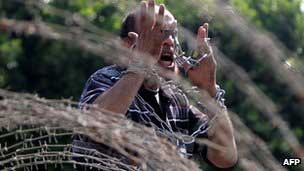 The Muslim Brotherhood has warned that Egypt's fragile democratic gains are under threat, after a surprise court ruling overturned last year's parliamentary elections.
The Muslim Brotherhood has warned that Egypt's fragile democratic gains are under threat, after a surprise court ruling overturned last year's parliamentary elections.
Egypt could see "dangerous" days ahead if power returned to those linked to the previous regime, it said.
The group's candidate, Mohammed Mursi, faces ex-PM Ahmed Shafiq in a runoff presidential election this weekend.
The decision by the Supreme Court on Thursday plunged Egypt into turmoil.
The court said last year's parliamentary vote - the first free and fair poll in decades - was unconstitutional, and called for fresh elections.
The decision effectively puts legislative power into the hands of the ruling Supreme Council of Armed Forces (Scaf), who were tasked with overseeing Egypt's transition after the toppling of President Hosni Mubarak in February 2011.
The court also upheld the right of Mr Shafiq to run for president.
'Wiped out'
Activists, who fear Scaf is trying to increase its power, have denounced Thursday's rulings as a "coup" designed to undermine the revolution, carried out by judges appointed under former President Mubarak.
The BBC's Jon Leyne in Cairo says that while judges were expected to rule that some parts of the parliamentary poll was illegitimate, the court went much further by ordering a complete re-run.
In a statement, the Muslim Brotherhood - which won 46% of seats in parliament - said the decisions indicated Egypt was heading into "very difficult days that might be more dangerous than the last days of Mubarak's rule".
"All the democratic gains of the revolution could be wiped out and overturned with the handing of power to one of the symbols of the previous era," it said.
Mr Mursi said he was was dissatisfied but accepted the court's rulings.
"I respect the decision of the Supreme Constitutional Court in that I respect the institutions of the state and the principle of separation of powers," he told Egyptian TV, according to AFP.
But in a later speech he appealed to voters, with a warning that the country was at a turning point.
"A minority are trying to corrupt the nation and take us back. We will go to the ballot box to say no to those failures, those criminals."
Other political figures hit out at the ruling, warning that the decision would leave the incoming president without a parliament or a constitution.
Islamist Abdul Moneim Aboul Fotouh, who took part in the first round of the presidential vote in May, said that dissolving parliament amounted to "a total coup, anyone who imagines that the millions of youths will let this pass is dreaming."
The Salafist Al-Nour party, which has the second biggest representation in parliament, said the ruling showed "a complete disregard for the free will of voters".
Hundreds of protesters gathered in Cairo's Tahrir Square after the announcement to express their anger.
However, correspondents said the real measure of anger will be tested after prayers on Friday, when demonstrations are usually held.
US Secretary of State Hillary Clinton told reporters "there can be no going back on the democratic transition".
.jpg) 'Historic ruling'
'Historic ruling'
Meanwhile, Mr Shafiq told supporters that the court had made a "historic ruling and verdict that meant there was no way for anyone to do particular laws for particular people".
Egypt's ruling military council (Scaf) held an emergency meeting after the two court rulings and later confirmed that the election would go ahead as planned, and urged Egyptians to vote.
But uncertainty about the intentions of the military had already been raised on Wednesday when the justice ministry announced that army personnel would have the right to detain civilians during the election period.
The court had been considering the validity of the parliamentary election, because some of the seats were contested on a proportional list system, with others on the first-past-the-post system.
It decided that the election law had allowed parties to compete for the one third of seats reserved for independent candidates.
The head of the supreme court Farouk Soltan told Reuters: "The ruling regarding parliament includes the dissolution of the lower house of parliament in its entirety because the law upon which the elections were held is contrary to rules of the constitution."
(Source : BBC)
 The Muslim Brotherhood has warned that Egypt's fragile democratic gains are under threat, after a surprise court ruling overturned last year's parliamentary elections.
The Muslim Brotherhood has warned that Egypt's fragile democratic gains are under threat, after a surprise court ruling overturned last year's parliamentary elections..jpg) 'Historic ruling'
'Historic ruling'